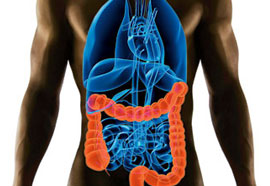Most of you will have heard the expression “you are what you eat” but just as you’ve got used to saying it, the experts have gone and changed it. So you are now “what you eat, breakdown, digest and absorb”.
Mainstream media is really starting to pick up on the benefits of good gut health and so they should, it really underpins your chances to be successful with any training goal, be it fat loss, muscle gain or sports performance.
The gastrointestinal tract (GI) its where food is broken down into simpler chemical forms (nutrients) specialised enzymes for the digestion and absorption of macronutrients (protein, carbohydrates and fats) and micronutrients (vitamins and minerals). The GI allows these nutrients and water to enter the body while preventing the entry of toxins/antigens. It’s a selective barrier between “us” and the outside world. But a distressed gut can’t act in our defence. Instead, it allows dangerous compounds to enter the body and its estimated that digestive problems account for nearly 10% of all healthcare spending. So if your serious about your goals you should be serious about your GI health as the list of benefits makes for compelling reading:
Benefits of good GI health include:
- Helps with managing body weight
- Improves immune health
- Improves mood and mental health
- Boosts energy levels
- Improves cholesterol levels
- Regulates hormone levels
- Improves oral health
Here are some steps to promote the livelihood of the bacteria in our gut:
- Eat at least 7 servings of fruit and veg per day – vegetables and fruit provide resistant starch and pre-biotics as well as phytonutrients that interact with gut bacteria and have a anti-inflammatory effect. Eat a variety of fruits and vegetables, aim to eat all colours of the rainbow across the week. Ideally eat fresh fruit and vegetables, however canned and frozen are also very good.
- Eat fermented foods regularly – healthy bacteria are found in yoghurt and other fermented foods like sauerkraut, kefir, kombucha and cultured dairy products.
- Take a prebiotic supplement and/or eat prebiotic foods – a prebiotic differs from a probiotic in that it is a form of fibre that the healthy bacteria in your GI tract can feed on, allowing them to proliferate, which is key for an overall healthy microbiome. Prebiotics come from high-fibre foods such as bananas, potato starch, oats, raw asparagus & chicory and onion & garlic. Supplementing is especially important for people who don’t eat grains or have a low-carb intake because you are at risk of being deficient in prebiotics.
- Take resistant starch – resistant starch is a type of fibre (similar to prebiotics) that is resistant to digestion, feeding the healthy gut bacteria. When gut bacteria feed on resistant starch, they produce a short chain fatty acid called butyrate that is involved in promoting the health of the intestinal cell layer in the gut. Resistant starch is found when starchy foods like potatoes are rice are cooked and then cooled. You can also get it by supplementing with 20 to 30 grams of unmodified potato starch.
- CHEW – in our culture it’s normal to scarf our food, but this habit has a harmful effect on your “good” gut bacteria. When large food particles hit your intestines, harmful gut bacteria feed on them, which leads to inflammation and deprives you of the nutrition. Try chewing each bite at least 15 times: You’ll benefit from a greater release of hunger reducing hormones and a healthier microbiome.
- Avoid NSAIDs – NSAID’s restrict blood flow to the kidneys and damage the protective intestinal barrier, which has a negative effect on healthy bacteria. Two natural supplements that promote gut health and have an anti-inflammatory, pain killing effect are curcumin and boswellia.
- Exercise – it’s no surprise that people who train regularly have a more diverse microflora, which is associated with better health. Recent research shows that beyond burning calories, exercise actually encourages the growth of bacteria that is linked to leanness while suppressing other sorts that are associated with obesity.
- Limit consumption of alcohol, refined sugar and artificial sweeteners – which can kill good bacteria and feed the bad bacteria in our GI tract.
- Consider supplementing with probiotics if taking antibiotics – Anyone who has been on a round of antibiotics could benefit from taking probiotics close to the end of the course of antibiotics.
Personally I am yet to be convinced by the research into probiotics, the gut is one of the most hostile environments in the human body and to think that we can colonise our gut bacteria with new strains by consuming probiotics just doesn’t make sense and the research doesn’t back them up either. However the data into taking a probiotics after or during course of antibiotics (antibiotics wipe out all the gut bacteria) does have some good evidence so thats really the only time i would suggest using them.
To me it make far greater sense to help feed the good gut bacteria within our body rather than trying to replace with lab cultured strains, our gut is just to damn cleaver for that.



